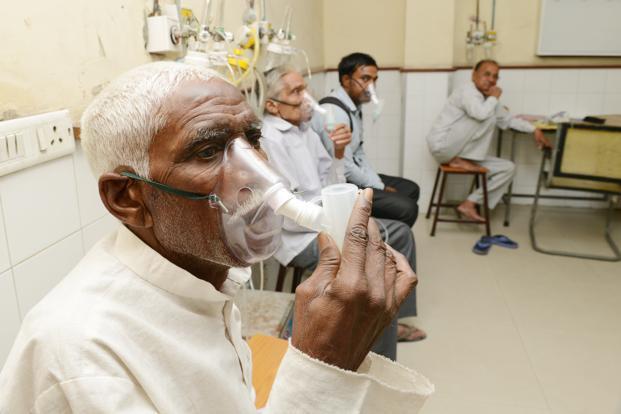PM’s Promise to Eradicate TB by 2025 Far-fetched?

Representational image. | Image Courtesy: Live Mint
In July 2019, the Ministry of Health signed a Memorandum of Understanding (MoU) with the Ministries of Defence, Railways, and AYUSH to eliminate tuberculosis from India by 2025. The MoU was signed in the presence of Minister of State for Health Ashwini Choubey and Minister of AYUSH Shripad Nayak. Prime Minister Narendra Modi had earlier announced in March 2018 that India would eliminate the disease in the next six years.
However, a look at the data presented in the Global Tuberculosis Report 2018 published by World Health Organisation (WHO) makes one wonder if it is possible to achieve that goal, or if it is just one of the thousands of promises made by the Prime Minister with no intention to fulfil. According to the report, released in the United Nations headquarters in New York in September 2018, India was the country with the highest TB burden in the world. Most of the world’s under-reported cases as well as multi-drug resistant cases were also in India.
The report said that two of the primary routes to reducing TB incidence and death are diagnosis and treatment, areas where "large and persistent" gaps remain. Of the 10 million new and relapsed cases in 2017, only 6.4 million, that is, 64%, were officially reported to national authorities and the WHO. Ten countries accounted for 80% of the 3.6 million gap, led by India (26%), Indonesia (11%), Nigeria (9%). The gap was suspected to be caused by a combination of under-diagnosis and under-reporting. India also led in cases of Multi-Drug Resistant TB (MDR-TB). Nearly half of the world's MDR-TB cases were in India, according to the WHO report.
Last year, at the Global Conference on Primary Health Care in Astana, Kazakhstan, world leaders endorsed a new declaration emphasising the critical role of primary health care around the world. The declaration states, “Strengthening primary health care (PHC) is the most inclusive, effective and efficient approach to enhance people’s physical and mental health, as well as social well-being, and that PHC is a cornerstone of a sustainable health system for universal health coverage (UHC) and health-related Sustainable Development Goals.”
Also read: CGHS Struggles With Poor Infrastructure and Shortage of Doctors
However, India’s primary health care system, lacking proper infrastructure and manpower, struggles to meet even the most basic among the needs of the citizens of the country. Most of the posts at sub centres and primary health centres, the two fundamental centres for primary health care, remain vacant.
According to the WHO report, there were a total of 17,86,681 TB notifications in India in the year 2017, which included both new cases and relapses. 4,21,000 people died from the illness in the year 2017, in India. The estimated number of TB incidences was 27,40,000 out of which 2,31,000 patients were children below 14 years, and 8,60,000 was the number of female patients.
Another factor that affects the process of eradicating TB is the lack of funding from the Centre. According to the TB India Report 2018, there was a huge difference between the funds requested for Revised National Tuberculosis Control Programme (RNTCP) and the budget allocation and funds released by the Centre. In the years since the Modi government came into the power till 2018, that is, between the fiscal years 2014-2015 to 2017-2018, the fund requested by RNTCP was Rs 5,858 crores, and the total budget allocation for the programme was Rs 3,830.15 crores, which is only 65.38% of the requested budget. Further, the fund released by the government was only Rs 1,816.17 crores, that is, just 31% of the requested budget.
According to a study published in the Indian Journal of Tuberculosis in March 2019, despite provision of free treatment, 25% of Indian TB patients had to sell assets to pay for their treatment, reported Business Standard. According to the study, even among the patients who received free care, 21.3% of patients resorted to hardship financing. The study estimated that 26.7% of impatient TB cases and 3.5% of outpatient cases experienced hardship financing. In all, 25.9% of the patients had to sell assets or use borrowings for financing TB expenses.
Tuberculosis continues to be one of the largest public health threats in the country. A new study published in the Lancet Global Health Journal also reveals that survivors of tuberculosis are at risk for developing chronic lung diseases. The study notes that 40% of bronchiectasis cases in India occurred in individuals who had recovered from tuberculosis. Bronchiectasis is a lung disease which impairs the airways and can cause extensive damage.
The study observed 2,195 individuals from over 14 Indian states. It was found that individuals in India who had recovered from tuberculosis made up a large percentage of patients who presented with severe lung infections and childhood pneumonia. Furthermore, the researchers noted that such infections led to individuals suffering from chronic cough and an overall low quality of life.
Given the disease burden of tuberculosis in the country and the lack of funding from the centre, the Prime Minister’s promise looks a little less than achievable. And even if it comes true and India magically becomes tuberculosis-free by 2025, what happens after that? The country right now has no plans to fight the Bronchiectasis epidemic that might plague the country in the coming years.
Also read: India’s Healthcare System Struggles With Rise in Non-communicable Diseases
Get the latest reports & analysis with people's perspective on Protests, movements & deep analytical videos, discussions of the current affairs in your Telegram app. Subscribe to NewsClick's Telegram channel & get Real-Time updates on stories, as they get published on our website.
























